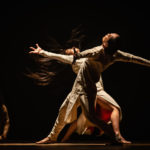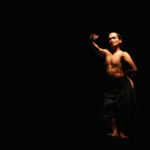
© » KADIST
Akram Zaatari
“People often asked if they could pose with the Kodak advertisement where a full scale woman is featured with a camera offering Kodak rolls. They invented the poses, the gestures and situations.” Hashem El Madani. Hashem El Madani, a studio photographer in Saida, began working in 1948.

© » KADIST
Akram Zaatari
“Films inspired people a lot. they came to perform kissing in front of a camera. In a conservative society such as Saida, people were willing to play the kiss between two people of the same sex, but very rarely between a man and a woman.

© » KADIST
Akram Zaatari
“While taking the picture it was challenging to make the boys sit properly without moving. Sometimes a member of the family whould hide behind, holding the child.” Hashem El Madani. Hashem El Madani, a studio photographer in Saida, began working in 1948.

© » KADIST
Akram Zaatari
Hashem El Madani, a studio photographer in Saida, began working in 1948. Like all studio photographers his subjects came to him. The studio was a constant flux of visitors.

© » KADIST
Akram Zaatari
“People often asked if they could pose with the Kodak advertisement where a full scale woman is featured with a camera offering Kodak rolls. They invented the poses, the gestures and situations.” Hashem El Madani. Hashem El Madani, a studio photographer in Saida, began working in 1948.

© » KADIST
Akram Zaatari
“People often asked if they could pose with the Kodak advertisement where a full scale woman is featured with a camera offering Kodak rolls. They invented the poses, the gestures and situations.” Hashem El Madani. Hashem El Madani, a studio photographer in Saida, began working in 1948.

© » KADIST
Akram Zaatari
“When you position your hand on someone’s shoulder, your shoulders become straight and horizontal. Placing one’s hand on a stable surface helps position the shoulders and the general posture of the body.” Hashem El Madani. Hashem El Madani, a studio photographer in Saida, began working in 1948.

© » KADIST
Akram Zaatari
“Other photographers used to send me negatives of cross-eyed people, asking me to retouch them. I used to scratch out the emulsion where the pupil is, and draw another one right next to it.” Hashem El Madani. Hashem El Madani, a studio photographer in Saida, began working in 1948.

© » KADIST
Akram Zaatari
“These are negatives that were scratched because of a jealous husband from the Baqari family, who never let his wife out by herself. He was upset to know that she came to be photographed in my studio without telling him. He came asking for the negatives.

© » KADIST
Akram Zaatari
“In the 1980s I started using coloured paper backdrops, one of which was yellow. You can see they never reached the floor. I used them for colour and black-and-white photography.” Hashem El Madani.

© » KADIST
Akram Zaatari
“The two men were relatives and both were in the Lebanese Army.” Hashem El Madani. Hashem El Madani, a studio photographer in Saida, began working in 1948. Like all studio photographers his subjects came to him.

© » KADIST
Lars Laumann
Eija Riitta was born in 1954 in Liden, Sweden, and is “objectum-sexual.” Since June 17, 1979, her name is Eija Riitta Berliner Mauer taking the name of her husband, the Berlin Wall. In animism all elements of nature are considered as alive and have souls. “Objectum-sexuality” is an extension of this belief.
Akram Zaatari
- location: Sayda, Al-Lubnan
- year born: 1966
- gender: male
- nationality: Lebanese
Lars Laumann
The films of Lars Laumann incorporate codes of documentary, grappling with topics at the limits of fiction...

© » ARTS EQUATOR
about 67 months ago (10/18/2018)
“Until the Lions” by Akram Khan Company: What About the Lioness? | ArtsEquator Thinking and Talking about Arts and Culture in Southeast Asia Articles Bernie Ng Photo: Bernie Ng, courtesy of Esplanade – Theatres on the Bay October 18, 2018 By Jocelyn Chng (1160 words, six-minute read) Until the Lions , a work that premiered in 2016 at the Roundhouse in London, is presented as one of the main (Centrestage) programmes at the 2018 Esplanade da:ns festival ...

© » ARTS EQUATOR
about 68 months ago (10/09/2018)
"Hijrah": Tubuh di Antara dan Migrasi Gender | ArtsEquator Thinking and Talking about Arts and Culture in Southeast Asia Articles Sapto Agus October 9, 2018 By Michael HB Raditya (1000 words, five-minute read) Read this review in English ...

© » ARTS EQUATOR
about 68 months ago (10/09/2018)
"Hijrah": In Between Body and Gender 'Migration' | ArtsEquator Thinking and Talking about Arts and Culture in Southeast Asia Articles Sapto Agus October 9, 2018 By Michael HB Raditya (1018 words, five-minute read) Read this review in Bahasa Indonesia ...
-
1950-1959
Akram Zaatari
1950“While taking the picture it was challenging to make the boys sit properly without moving...
Akram Zaatari
1950“Other photographers used to send me negatives of cross-eyed people, asking me to retouch them...
Akram Zaatari
1950“In the 1980s I started using coloured paper backdrops, one of which was yellow...
Akram Zaatari
1956“People often asked if they could pose with the Kodak advertisement where a full scale woman is featured with a camera offering Kodak rolls...
Akram Zaatari
1957“These are negatives that were scratched because of a jealous husband from the Baqari family, who never let his wife out by herself...
-
1960-1969
Akram Zaatari
1960“When you position your hand on someone’s shoulder, your shoulders become straight and horizontal...
Akram Zaatari
1966“People often asked if they could pose with the Kodak advertisement where a full scale woman is featured with a camera offering Kodak rolls...
-
1970-1979
Akram Zaatari
1970“People often asked if they could pose with the Kodak advertisement where a full scale woman is featured with a camera offering Kodak rolls...
Akram Zaatari
1972“The two men were relatives and both were in the Lebanese Army.” Hashem El Madani...
-
2000-2009
Lars Laumann
2008Eija Riitta was born in 1954 in Liden, Sweden, and is “objectum-sexual.” Since June 17, 1979, her name is Eija Riitta Berliner Mauer taking the name of her husband, the Berlin Wall...






